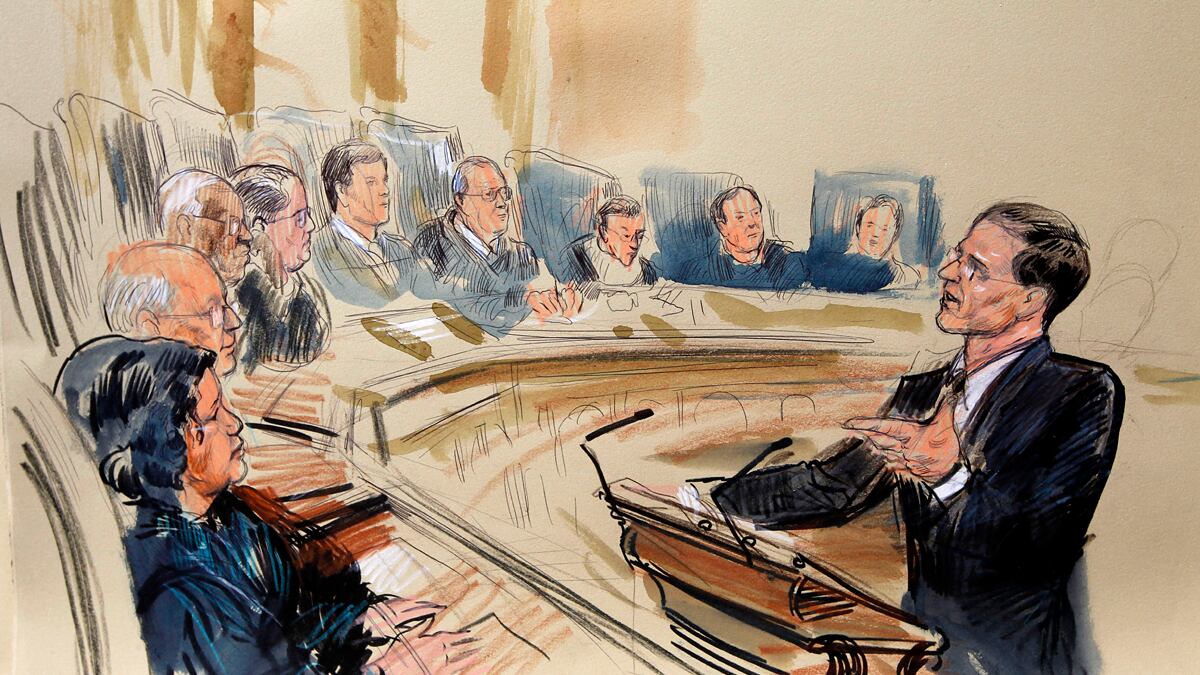If you were watching Justice Anthony Kennedy for a clear sign of whether the Supreme Court will uphold the key component of the Affordable Care Act—known as the individual mandate—then you probably left Tuesday’s arguments at the Supreme Court disappointed.
The first wave of commentary spilling down the steps of 1 First Street pointed out that Kennedy, who votes in the majority more often than any other Justice in 5–4 cases, and is thus considered the court’s most critical vote, was deeply skeptical of the mandate. To some this suggested that the law is likely doomed.
Reports of Kennedy’s skepticism were not exaggerated: at one point he said that the law as written "changes the relationship between the individual and the government in a very fundamental way." But by the end of the second day of arguments in this landmark case, Kennedy also wavered in the other direction, saying that “most questions in life are matters of degree.”
Court watchers have never considered Kennedy to be the only justice in play—in fact, it’s believed that of the five right-of-center members of the court, only Clarence Thomas is a firm no—but Kennedy’s seesawing both focused the attention on him and served as an ominous sign for those who believe the Affordable Care Act will be upheld.
Tuesday’s arguments were all the more remarkable because so many legal observers had presumed that the individual mandate would easily pass constitutional muster. The Commerce Clause, once interpreted so stringently that Congress was prohibited from regulating child labor, eventually expanded to allow for a much broader allowance of federal regulation of economic activity. The question before the court now is whether the choice not to buy health insurance, which the mandate would penalize (or “tax,” depending on who’s making the argument), is in fact economic activity.

The general agreement was that the Obama administration’s lawyer, Solicitor General Donald Verrilli, did not make this case well, failing to parry the conservative justices’ pointed challenges to the law’s validity. A stronger articulation of the idea can be found, unexpectedly, in the concurring opinion of Jeffrey Sutton, a conservative judge from the Sixth Circuit Court of Appeals, who wrote in defense of the law in one of the cases challenging the ACA’s constitutionality. In his opinion, Sutton wrote, “No one is inactive when deciding how to pay for health care, as self-insurance and private insurance are two forms of action for addressing the same risk.” After all, sickness is inevitable, Sutton reasoned, so choosing not to purchase private insurance is merely relying on “self-insurance,” which is also an economic decision.
However, the justices on Tuesday were more concerned with finding “a limiting principle” to Congress’s power under the Commerce Clause. Several pummeled Verrilli with hypothetical mandates for products—ranging from Justice Samuel Alito, who suggested burial insurance, to Chief Justice John Roberts, who mentioned mandatory cellphones. While Verrilli was less than sparkling, his adversary, former solicitor general Paul Clement, turned in what one veteran court watcher said was “the best argument I've ever heard.”
The court on Wednesday will focus on severability, or how much of the law could remain on the books if it decides the mandate is unconstitutional. Many observers have assumed that this argument would be relatively academic, since the mandate appeared to be in good shape. But after the government’s apparent failure to win a clear fifth vote on Tuesday, tomorrow’s arguments could help determine whether all 2,000 pages of the Affordable Care Act are thrown out.






